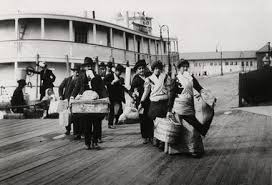
A dear friend on
Facebook has suggested that kids would be far better off if Bibles were read in
the classroom.
I agree that there’s
nothing wrong with bringing Bibles to school provided that they are
used solely for
paperweights or doorstops. After all, over
the centuries, the Bible has been used for a totally different kind of
education.
For example, in
the Middle Ages, the Bible was used to justify massacres of nonbelievers. It encouraged knights to go on murderous Crusades. It validated anti-Semitism and wholesale abuse
of anyone who wasn’t Catholic. It was then
used to induce wars between Protestants and Catholics, and attacks on
scientists.
 |
| Slaves at work |
In the 1800s, biblical verses gave support to
racism and slavery.
Southern ministers
quoted such revered lines as "slaves, obey your earthly masters with fear and
trembling" (Ephesians 6:5), or "tell slaves to be submissive to their
masters and to give satisfaction in every respect" (Titus 2:9).
How could you oppose slavery in the face of
that?
Northern
ministers used the Bible and came to a different conclusion. Citing the Book of Revelation, they argued
that victory by the North would pave the way for Jesus’ return.
Same book,
different thoughts.
The Bible became
a cudgel against women’s suffrage and for prohibition. It quickly morphed into a weapon against
women’s rights and even women athletics.
It was quoted by senators opposed to the Civil Rights Act, while
ministers like Dr. Martin Luther King Jr. relied on biblical verses to urge
their cause.
 |
| MacArthur |
Today, gay rights
are continually attacked on biblical grounds.
At the same time, the Bible is being used to justify ignoring Climate
Change.
Evangelical radio minister John
MacArthur, for one, has spoken out against environmentalists.
Citing the Bible, he said they were wrong to
try to preserve the Earth because “the Lord is going to destroy it.”
In contrast, other ministers cite biblical
texts calling on us to be good husbands to the planet.
You name the issue:
opponents and proponents take turns swatting each other with Bible quotes. How that approach will aid education eludes
me.
 |
| Abraham? |
The reality is
that the Bible’s 66 books contain enough contradictory statements to support
any cause, even nefarious ones.
On top
of that, the Bible is the best-known unread book in the world.
People learn names, such as Jesus, Moses,
Abraham and so on, but have no idea of the lengthy investigations into the
historicity of textual events and sayings.
As the result,
they are easily victimized by unscrupulous clergy who calmly quote the text out
of context. That’s how early Christians
could look at the Jewish religious books and “find” references to Jesus, which
are actually nonexistent.
That’s also how
today’s evangelicals can ignore every gain in scientific knowledge because of
words in a book written by people who didn’t examine a modicum of today’s
hard-earned research.
 |
| Bible class in college |
I am not opposed
to education courses that deal with religion, provided they are taught in an
ecumenical way.
I took one in high
school and regularly teach classes in religious history.
All of us need to know about other belief
systems.
Everyone should learn about the
intense studies of biblical figures, events and sayings.
The Bible is an integral part of the Western cultural
heritage; it shouldn’t be ignored.
But, if those
classes are going to be used to indoctrinate, then the Bible and religion
should remained banned from school. Educational
systems these days are bad enough. Bring
the Bible to class will only make them worse.
***
Long-time
religious historian Bill Lazarus regularly writes about religion and religious
history with an occasional foray into American culture. He also speaks at
various religious organizations throughout Florida. He holds an ABD in
American Studies from Case Western Reserve University and an M.A. in
communication from Kent State University. You can reach him at wplazarus@aol.com.
He
is the author of the famed novel The Unauthorized Biography
of Nostradamus as well as The Last Testament of Simon Peter;
The Gospel Truth: Where Did the Gospel Writers Get Their Information;
Noel: The Lore and Tradition of Christmas Carols; and Comparative
Religion for Dummies. His books are available on
Amazon.com, Kindle, bookstores and via various publishers. He can also be
followed on Twitter.
In
addition, you can enroll in his on-line class, Comparative Religion, at
http://www.udemy.com/comparative-religion-for-dummies/?promote=1











